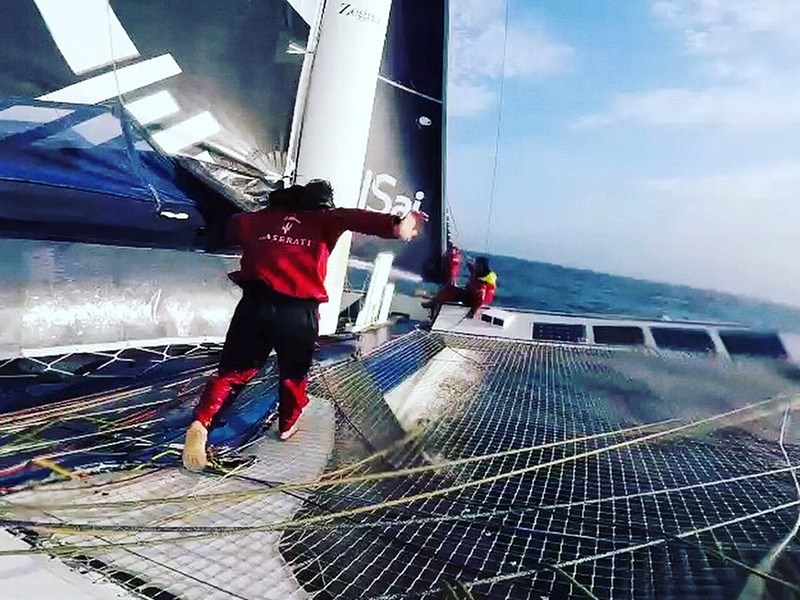
Giovanni Soldini’s Maserati Multi70 crossed the Transpac Race finish line off Honolulu under a full moon at 11.18 and 55 seconds Italian time on July 11 (23.18 and 55 seconds, on July 10 in Hawaii).
Wind conditions during the 2,225-miles long race were in the 13 – 21 knot range – excellent for fast multihull sailing. Soldini’s men made good use of Maserati Multi70’s capability to fly above the water on its hydrofoil dagger boards and on the second day at sea they edged ahead of their main rivals – the non-foiling American trimarans Phaedo3 and Mighty Merloe.
However, the situation changed on Sunday when Maserati Multi70’s starboard rudder assembly was destroyed by a collision in the dark with an unseen solid chunk of ocean debris. The crew stopped the boat and despite strong winds and choppy seas they managed to retrieve the snapped off rudder blade remained attached to the boat by a control line.
“We were lucky to be able to save the rudder,” Soldini said. “It took a long time for two of us to pull it in near to the boat. It was jumping around behind us in the waves like a big fish. Eventually, we got it close enough to attach a halliard and wrestle it on board.”
It took a little over an hour before the Italian boat was back in the race and although limited by the missing rudder on port gybe, Maserati Multi70 could sail at full speed on starboard gybe. The sailors pushed the boat to its limits to try to claw back some of the miles lost to their rivals and at one point looked to be gaining ground. Ultimately though, they had to settle for a third-place arrival in Hawaii.
Soldini said the crew was tired but happy to have made it safely to Hawaii, but also disappointed to have lost so much time and distance with their broken rudder.
“We are a little sad to have lost out so much because of the rudder,” he said. “I think we had sailed a good race up until then and we were enjoying the battle with the other two. We lost an hour retrieving it – that is 25 miles in these multihull boats”.
“Afterwards, we were at least four knots slower without the rudder on that side and when the central rudder loses its grip, the boat spins out and you have to completely ease all the sails to get going again. It takes about 20 minutes to recover and it happened at least 15 times.”
Although they did not get the result they were looking for, the Maserati Multi70 crew sailed a total of 2,636 miles on the four-and-a-half day crossing and were able to gather lots of valuable performance data that will help with their quest to fully master the art of offshore foiling.
“It was our first time sailing the boat when we could fly on both sides,” Soldini explained. “We learned a lot of new things about how to sail the boat and now we have a ton of data to analyse on the computer. Our goal is to build an accurate table that will help us better determine when are the best times to fly and when it is better not to.”
“We are committed to the concept of an ocean-going flying boat and more than ever convinced that this is where the future of ocean racing lies. We need to put some thought into how we deal with the risk of ocean debris damaging the rudders and we have some innovative ideas to consider.”
The challenge is supported by Maserati which, as main sponsor, gives the boat her name, while UnipolSai Assicurazioni is sponsor.
The official suppliers to the challenge are Ermenegildo Zegna for clothing and Boero Bartolomeo S.p.A. for hull enamels and paints.